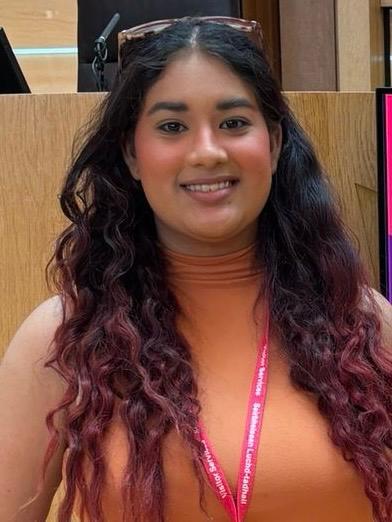Transracial foster placements are a regular topic of conversation between NYAS Cymru’s Young Persons Advisory Group (YPAG) - a group of care experienced changemakers working with NYAS to ensure our services and projects across Wales meet the needs of care-experienced young people. In February, YPAG members accompanied NYAS to London to attend The Black Care-Experience Conference, which explored how racism and discrimination directly impact the lives of black and children and young people in care.
Rayya, (21) who attended, was born in Mauritius and described feeling that her experiences were validated when she heard the life stories of the conference speakers, their journey through care, and the racism and other hurdles they had overcome. Race was very complex for Rayya, who due to misinformation, has described herself as being “Caribbean”, despite being born in Mauritius – an island off the southeast coast of Africa. Rayya is keen to raise awareness of the reality of being in foster placements with families from different ethnic, cultural and religious backgrounds.
Rayya's Story
I arrived in the UK from Mauritius with my family when I was six months old and my siblings and I got taken into care when I was four. We were initially separated but later reunited in the second of three homes I lived in.
Despite us all being together, this house was a bad experience for me despite us all being together. We were treated differently from the white children, and often they got away with lots of things that we would not.

All my foster carers were white and the fact that my skin was a different colour did not occur to me until I was with my first foster family and at primary school. I was told that I looked like poo. It made me feel very sad, I was crying and felt disgusting and wondered “why I do look like poo?”. For a long time, I claimed it, I thought poo is disgusting and so am I.
The teachers did not understand how I felt, instead told me to ignore it and that the child who said it did not mean it. I was told dry my tears and go back and play. The second time I experienced similar language; the pupil was made to apologise but I did not get any support. As I experienced more of these incidents, I did not have my parents to go to nor any support from my foster carers. I did not know what to say and I felt embarrassed. The conversations about race were always historical, it was Nelson Mandela, Rosa Parks, Martin Luther King. It was not taught in a way that explained that racism is very much still an issue in the UK. There were no separate water fountains or toilets, but racism was very real to me.
We talked about Islam in school, and this is how I learnt about my parents’ religion. It was all very theoretical, rather than being taught like it is a part of my identity. “Muslims are terrorists” was the message I was given from others - I knew my parents were not like that but it hurt that people could view people who they don’t know so negatively.
My foster carers said things they should not have said, and I should not have heard. Being forced into a competition by carers of “let’s see who can get darker in the sun” hurt and was insensitive. Social services did try and support me to learn Arabic, but the foster carers were resentful as they had to take us. We were given a choice whether to celebrate Christmas “OR” Eid.
I was not supported to be proud of my hair and skin colour or signposted to hairdressers to advise me. It was easier just to have straight hair.
It would have made a huge difference if I had had a foster carer from my own or a similar background. I am fully behind campaigns to increase the numbers of diverse foster carers. There should be more training, but foster carers should also be interested and want to do the research.
The conference made me realise how important it is to have positive role models who are like you. I have now learnt about my culture from my parents and travelled to Mauritius with them. My past had made me want to be white at times, but I am now proud of my colour.
NYAS Cymru support the Anti-racist Wales Action Plan and our work in this area is to advance the rights of ethnically diverse young people in care. If you would like to find out more, please contact: [email protected]